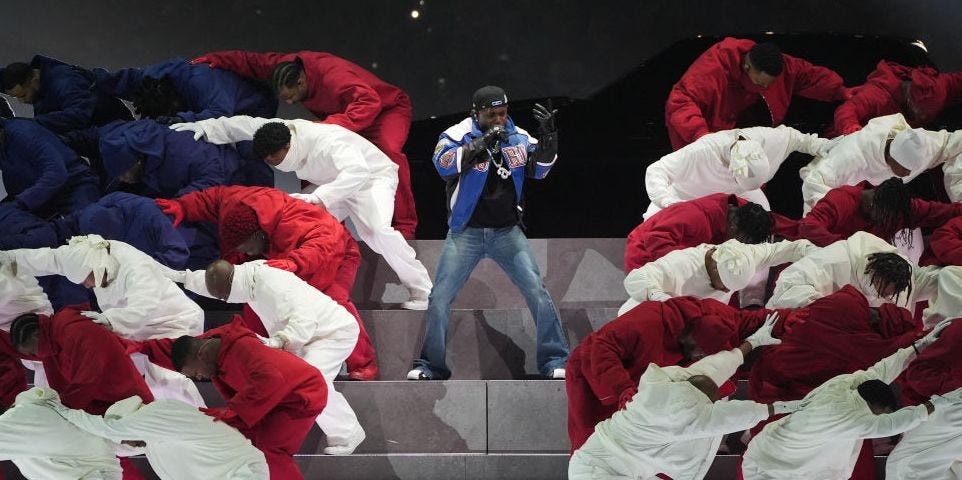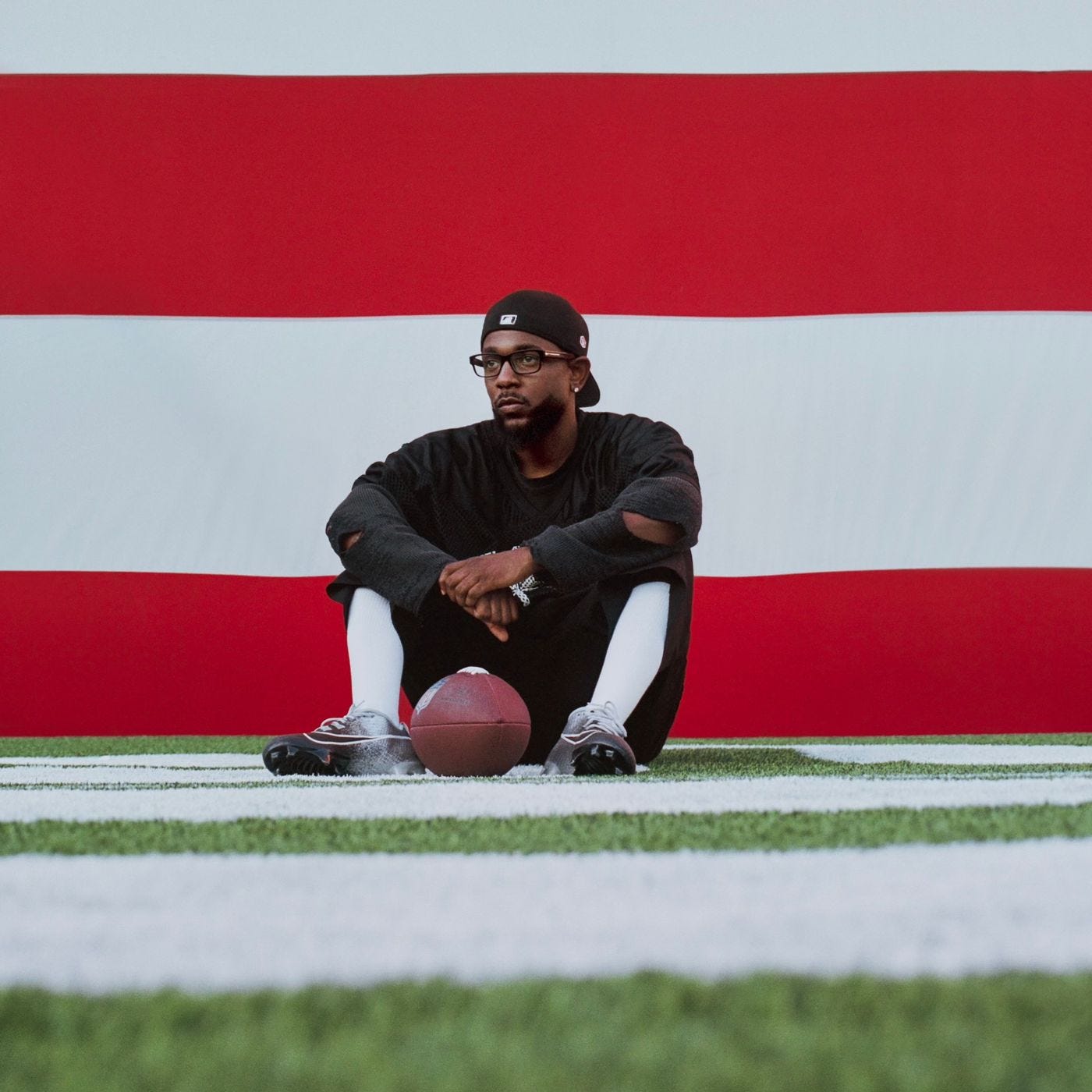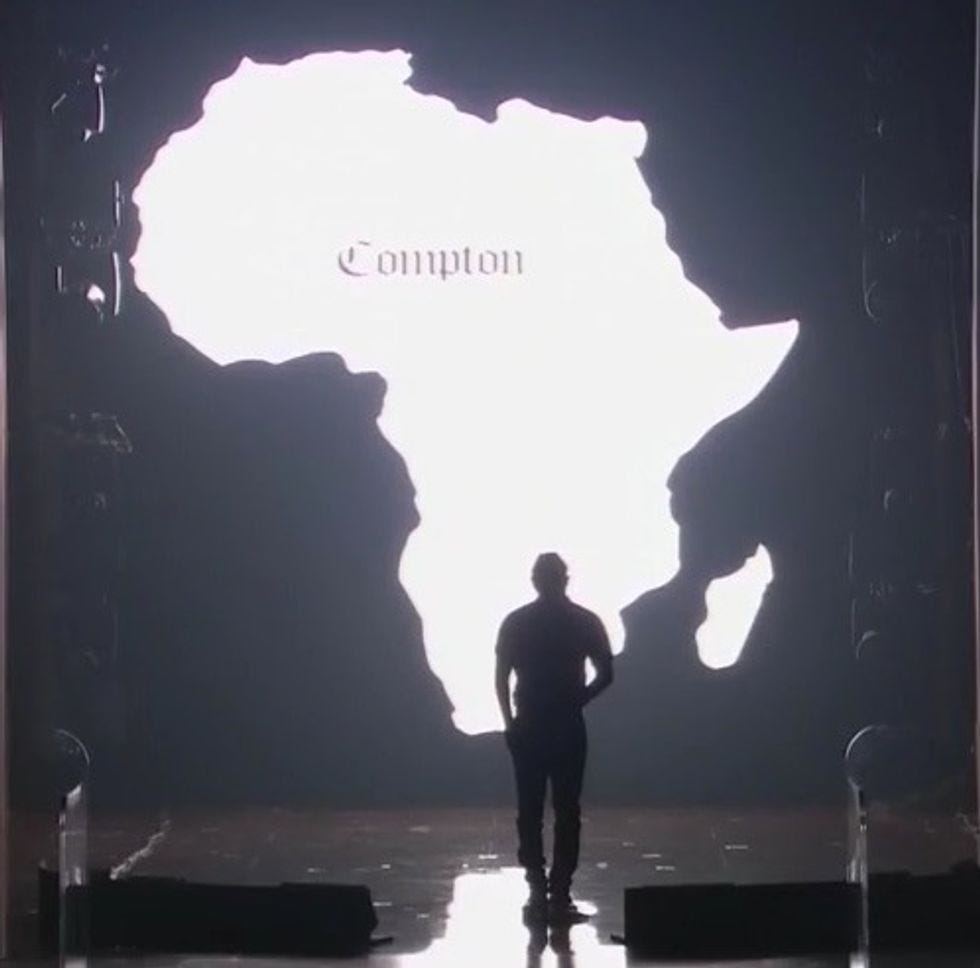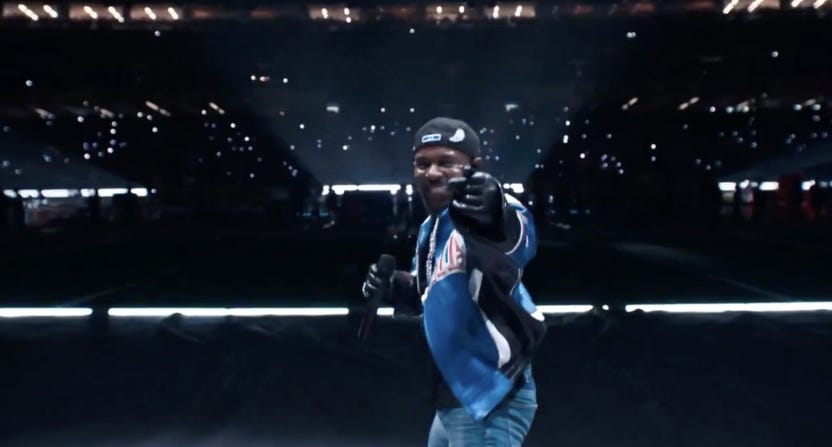Before we start I want to say a quick thank you to one of my subscribers, Katie. I wanted to write about this weeks ago but I thought no one would really care. But when Katie sent me a message asking where my newsletter on this topic was, it got rid of my doubts and I got to work putting all of the thoughts that had been sitting in my head for weeks onto paper. Thank you, Katie! I always value feedback from subscribers. If you have a comment or suggestion, never hesitate to leave me a comment, DM, or email me! 🍊
I had an experience last December that filled me with... euphoria. Last winter, on my way home to visit my family for Christmas, I learned that there is nothing like flying into LAX while listening to "dodger blue." There is absolutely nothing like it. I used to love flying into the airport and recreating the opening scene of The Graduate1, but last winter, Kendrick completely shifted my perspective on returning home to L.A. with a single-song soundtrack. He can capture a moment perfectly. He is a poet, and that Pulitzer is well earned.
All that to say, I am a Kendrick Lamar fan. I listen to his music pretty often. He’s made my Replay playlist every year. In 2024, he was my number-one artist, for obvious reasons.
Rap as a genre is full of people talking their shit, how they’re going to be rich and famous, how they’re going to hit it big (if in their mind they haven’t already), how vicious they are, how they’ll crush anyone who even tries to get in the way. A lot of the time, it’s just posturing, putting on a show, kayfabing over a catchy beat. But Kendrick is the boogeyman he says he is; he does exactly what he says he’s going to do. He stands tall2 as a radical hater. That, to me, is deeply inspiring.
But this press cycle isn’t just about being a hater. It’s also about revenge. Kendrick’s need for revenge, his affinity for being a hater, metabolized into a new level of success.
When it was announced that Kendrick would be performing at the Super Bowl halftime show, the only thing I could think about—the thing I was salivating over—was a packed stadium of people yelling, "A minorrrr" in unison, affirming Kendrick’s vengeful victory. I was giddy with goosebumps.
But then I thought about his 2016 Grammy performance. Kendrick could’ve just hopped on stage and simply entertained, he decided to explicate his own art—force the audience to sit in the uncomfortability of Black exploitation in a moment when he was supposed to be grateful to have even been nominated by the adjudicating body who snubbed him only two years earlier.
In this year’s halftime performance, Kendrick asks, “Do you want the famous me or the dangerous me?” That was essentially the same question I was asking when I found out he was performing at the halftime show.
That Monday morning, I woke up at six a.m., as I normally do. But instead of agonizing for twenty to forty-five minutes over the fact that I had to get out of bed and start my day, which I do every day, I rolled enthusiastically out of bed. I patiently sat through my morning meditation, but once the alarm went off, I jumped up, and before I could even roll up my yoga mat, I was frantically clutching at my remote, opening my Apple Music app, shaking with anticipation, waiting for the show to load.
I came away with the understanding that this performance was for fans like me, who were sitting on the couch shouting the lyrics along with Kendrick. I appreciated it, but I wouldn’t really say it was accessible for casual fans or even the average American audience. It was an ad, a practice run for his upcoming tour.
The halftime show is for performing hits. Real Bangers™. Kendrick’s performances revolve around narrating his experience as a Black man in America. But it’s near impossible to make any meaningful statements when you’re collaborating with the N.F.L., one of the most nationalistic, jingoistic organizations in the world. Most of Kendrick’s repertoire is immediately disqualified; surprisingly, the extremely pro-police and pro-military organization does not want to hear the truth about itself. Truly shocking stuff, I know.
It also neuters the message of whatever political statement Kendrick attempts to make. When Kendrick performed as a guest in the 2022 halftime show and even at the Grammys in 2016, he greatly censored renditions of “Alright.” Not just the cursing, but cutting the line “And we hate po-po / Wanna kill us dead in the street for sure.”
Additionally, he’s just come off of an almost yearlong victory lap. I think that this performance should’ve capitalized on that. Drake goaded Kendrick into this beef. “Drop, drop, drop,” Drake rapped over and over on “Push Ups,” the enticing missive that pushed Kendrick to drop... over and over and over and over again. Drake’s big diss was that Kendrick didn’t have hits, let alone upbeat songs that would get fans on their feet. He tried to put Kendrick in the box of conscious rap. Last year’s beef showed Kendrick breaking out and hiding the lock. Again, he is exactly who he says he is.
So it was frustrating that the message Kendrick attempted to deliver at the halftime show was so muddled. It was niche, which tracks— “Not Like Us,” the song and the meaning behind it—has prolonged Kendrick’s moment in the sun. According to fans, there are myriad interpretations of every millisecond. Kendrick simply rapping under a lamppost meant one thing to one viewer and something completely different to another. Samuel L. Jackson’s monologues were entire alternate universes in themselves. The video-game motif was in reference to at least fifteen different video-game franchises, at least according to multiple fans and viewers.

Kendrick was even lauded for being so audacious with his visual imagery in front of Trump. I spent no time on social media in February, but even the critics I follow offered up high praise for what, to me, was a tepid attempt at a statement of any kind, especially in the sociopolitical climate that we live in currently. Unfortunately, wearing pink blazers, dusting off pussy hats, and, yes, even creating an American flag out of Black men is a mere whisper in the face of the tidal wave of fascism that looms and is slowly starting to crash over America. We have to do something bigger than that. I don’t know—maybe something like letting the Gaza/Sudan protester stay up on the stage with you instead of tackling him and showing no support after the fact.3
Even watching the performance, I could tell it would be polarizing—not only to non-Black people—but also to older generations of Black people. And it was; the old heads in my family complained about the performance when I asked them what they thought of it. If I were sitting in the living room with them on Super Bowl Sunday, I know I’d want everyone to be in on the fun with me; I’d feel isolated having a good time by myself.
I also don’t think the message of “Not Like Us” is so precious that it needs to be explicated on Super Bowl Sunday. As true as it is, Kendrick kinda lost the battle when the song became a mainstay at bar mitzvahs, frat parties, W.A.S.P.-y prom nights, and grad parties.
The performance stuck with me—not necessarily because of what it got wrong, but because of the wasted potential. I immediately started to think about how I would do it. I watched halftime shows from the last thirty years. I meticulously analyzed runtimes, setlists, and themes. I went through Kendrick’s discography and reconciled it with the halftime show. That’s really what I wanted to share with you. I wanted to strike a balance between Kendrick’s upbeat hits and doing something thoughtful and artistic, true to his previous high-profile performances. Something that the elders could step to, something that the youngins could get hype to. So, without further ado, here’s my Kendrick Lamar halftime show.
Setlist (I also created a playlist you can listen to here)
1. Rigamortis, United In Grief, Count Me Out
I think it would be great to nod to Kendrick’s earlier work because his repertoire is consistently great. I think the jazz sample, performed by a college band (as was tradition at early Super Bowl halftime shows) would perk up the ears of elders and hipster art nerds alike. Also, the song is about what Kendrick will do to competition – send them into rigor mortis. It’s a callback and catalyst for the story of victory and vengeance he’s about to tell.
You then hear Kendrick’s fiancée Whitney Alford’s mesmerizing and encouraging voice: “tell them…tell them” before Kendrick is revealed onstage with a choir as he does the first verse of “Count Me Out.” The song serves as on ramp to the greatness we’re about to witness. It also builds on the narrative: don’t count Kendrick or his career out, he doesn’t want to, but he’ll show you if he has to.
2. squabble up
This is something I wouldn’t change about the show. The second verse and that Debbie Deb sample would get all the Gen Xers (and even some millennial gays) up and dancing. Also, it adds to the larger narrative: you wanna fight? Okay, squabble up!!!!
3. i
Again, more fun. Kendrick can keep the momentum here. Two different Isley Brother’s samples?!?! (That Lady, For The Love Of You) Plus that opening line: “I done been through a whole lot/ Trial, tribulation, but I know God” …Kendrick lightly preaching would absolve so many church going folk for skipping church for a damn football game. We have worship at home!!!! The elders would be on board.
4. Like That
This is Kendrick’s chance to get back into storytelling mode. He can bring us back to where it all began. Ending on (some kind of censored version of) “Motherfuck the big three, nigga, it's just big me”?!?!??!?! I think that would change lives. Honestly.
5. All The Stars
Okay, now’s the time to bring out SZA, her BBL, and her vocal track4. This was a pop hit, and it was a part of the huge cultural moment that was Black Panther. Kendrick has range!
6. 30 for 30
Kendrick and SZA can promote his Grand National tour. Plus, depending on how old they are, the audience would perk up at the sound of the “Throw Some D’s”/ “I Call Your Name” sample. At the end of this section, we’d hear the horns from “euphoria” interpolating the transition into…
7. Loyalty feat. Rihanna
This would’ve been great to see. Rihanna doesn’t want to give us any new music so seeing her perform is always like an instant shot of dopamine. The crowd would’ve gone wild. Maybe most importantly, it would’ve been hilarious to have not two but three of Drake’s exes perform with him on one of the world’s largest stages. At the end, you Ri’s iconic line: “it’s so hard to be humble, it’s so hard to be…”
8. HUMBLE
Again, something I wouldn’t change. This was a hit when it came out. It was so much of a hit that Miley Cyrus, recently saved from the clutches of hip hop herself, quoted this song as an example of the only rap she’ll listen to. That hard piano sample is etched into eardrums of every creed and color, it’s undeniable.
9. Backseat Freestyle
Oh, you thought Martin had a dream?? Well guess what bitch, so does this nigga Kendrick. Him going hard on that third verse would be amazing to see live. It would end with the iconic “yawk yawk yawk” we hear on “m.A.A.d City” before cutting to black
10. XXX., America Has A Problem Remix
If Kendrick wants to make some general statement about blackness in America, he can make it here, contained but concentrated. The poetic opening on XXX gives us a moment of reprieve from the audacious, high-energy performance we’ve been enjoying so far. “America/ God bless you if it's good to you/ America, please take my hand/ Can you help me underst—” into his Beyonce feature would go insanely hard. The moment of reprieve is over, we’re back to partying.
The lyrics call back to the overarching narrative. Kendrick’s verse is about how he’s usually a peaceful person but will become the boogeyman if he has to. He also references how AI can’t touch his rap skills. It predates his last years beef with Drake, but it’s more relevant than ever.5
11. Not Like Us
I would change nothing about the last 3.5 minutes of the show. Serena crip walking, everyone shouting “a minor”. A final nail in Drake’s coffin. Kendrick has optimized revenge for maximum effect. He can close the chapter here, knowing that, once again, the competition is in rigor mortis.
12. tv off
Again, a solid ending to his performance. Kendrick won. That’s all folks. The second half of the game isn’t even important, you can turn the TV off now.
cringe yes, but I am who I am baby!!!!!
figuratively
I can understand why Kendrick didn’t comment on this. It’s difficult to be the first solo rapper at the Super Bowl halftime show. You have to not fuck it up for everyone coming after you. You have to prove that your product is commercially viable, even though that’s the whole reason you were invited to perform in the first place. After Nipplegate, a black female popstar wouldn’t be back on the Super Bowl stage for eight years (Nicki Minaj’s feature with Madonna and then Beyonce’s headline the following year.) But again, just scrap the revolutionary message and have fun!
Absolutely no shame in using a backing track! Vocals can be hard to get right on live television in unpredictable, inclement weather. It was just very obvious, but again, nothing wrong with it.
Drake used an AI version of Snoop Dogg and Tupac on his Taylor Made Freestyle diss track in response to Kendrick’s Like That verse. Kendrick responded with euphoria and ended him, but didn’t let up! The rest is literally history.







